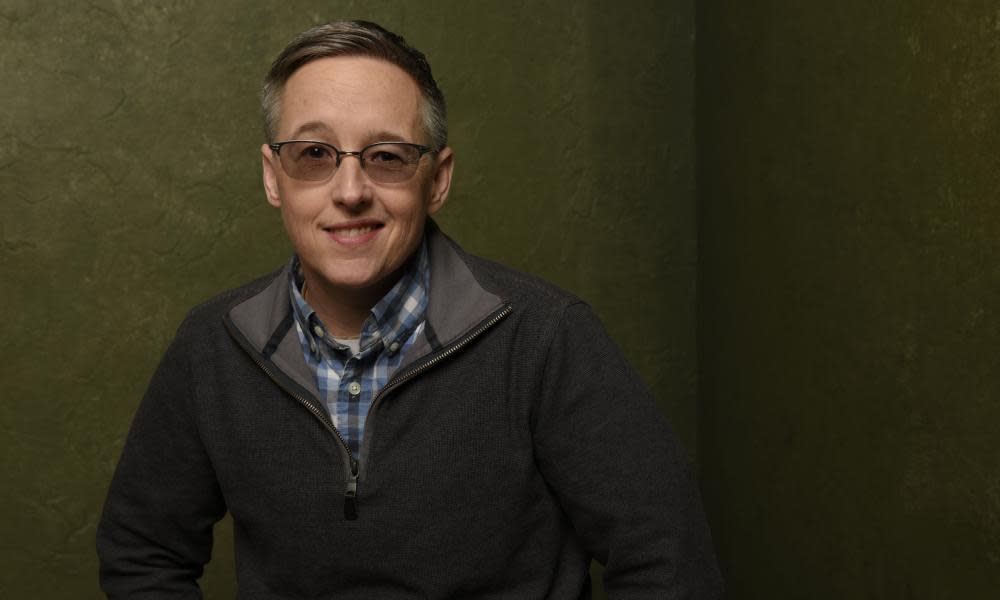Jenni Olson: ‘I remember walking out of the movie theatre like, “Yeah, I’m a cowboy!”’

When Jenni Olson accepts the Berlin film festival’s coveted Teddy award this month – for “embodying, living and creating queer culture” – she will join the ranks of past recipients including John Hurt, Joe Dallesandro and Tilda Swinton. “Me and Tilda, you know?” laughs the 58-year-old as she winces in the morning sunlight which is streaming into her home in Berkeley, California. With her youthful features, crisply side-parted hair and apostrophe-shaped eyes, she might have been drawn by Charles M Schulz.
“When I started my little gay film series at the University of Minnesota in 1987,” she says, “I never could’ve imagined that one of the largest film festivals in the world would recognise my work.” Along the way, she has been co-director of the San Francisco international lesbian and gay film festival as well as an influential curator, critic and archivist. She has taken her compilations of film trailers – including Homo Promo, Jodie Promo (Foster, that is) and the Jewish-themed Trailers Schmailers – to festivals around the world. Her vast collection of LGBT-themed film prints, along with the promotional materials that featured in her near-exhaustive collection The Queer Movie Poster Book, was acquired by Harvard last summer.
But Olson doesn’t just harvest, document and restore LGBT films – she also makes her own. The Joy of Life, from 2005, and its 2015 follow-up The Royal Road are playful, evocative 16mm film essays which feature static extended shots of urban landscapes. Voiceovers address some of her pet obsessions: the rhythms of Californian life, her own identity as a self-proclaimed “butch dyke”, and the intoxicating agony of nostalgia.
I’ve had my gender identity ‘stuff’ for as long as I can remember. Identifying with him made me feel heroic and aligned
“It’s not like I’m saying I want everything to be as it was,” she insists. “But my work is all about the importance of the past in helping us arrive at the present. That sums up everything I do. It’s about being alive and paying attention to the world.”
Another recurrent theme is the tendency of movies to become indistinguishable from the lives of those who love them. Her narrators’ reflections on their own romantic imbroglios bleed into reminiscences about classic Hollywood cinema: Vertigo, Sunset Boulevard, Meet John Doe. In her narration for The Royal Road, she describes how “experiencing myself as a fictional character has been a mode of survival for me”.
That process began during childhood cinema trips, where she was drawn to Terence Hill, the laconic, laidback star of Italian comic westerns. “I remember walking out of the movie theatre being like, ‘Yeah, I’m a cowboy!’” she grins. “He was this outsider, this trouble-maker with a good heart. He just wanted to do his thing but then he would always end up being heroic. He was a complicated protagonist.”
Is she describing herself? “I guess I did identify with him. He’s a guy, he’s very masculine, and I’ve had my gender identity ‘stuff’ for as long as I can remember. Identifying with him made me feel heroic and aligned.” The power of seeing oneself on screen is at the core of what Olson does, as some of her recent projects demonstrate: she has consultant producer credits on documentaries such as Disclosure, about the media portrayal of trans people, and has helped restore the films of Arthur J Bressan Jr, the late director of Buddies, the first feature about Aids.
As an ebullient, affable person, she seems surprised that some people have interpreted the title of The Joy of Life as ironic. Then again, this is a film concerned with the history of the Golden Gate Bridge as a suicide hotspot. It was made partly in response to the death there in 1995 of her colleague, friend and mentor Mark Finch, the Manchester-born co-founder of the London lesbian and gay film festival (now known as BFI Flare) who went on to become director at San Francisco, where they worked together. She called him “Bree” for Sabrina, his favourite of Charlie’s Angels, while he called her “Jim” after Jim Stark, the hero of Rebel Without a Cause.
In fact, the title is sincere: Olson evidently cherishes a life that has taken her, as she puts it, into “every area of the LGBT film ecosystem”. When I remind her that the Teddy prize is being awarded in recognition of “decades of bridge-building work with which she has made queer film history visible and tangible,” she gives a grateful smile. “I know it’s the industry side of it, connecting film-makers and festivals and distributors and all that, but it’s also been all about friendship. These people are my friends. They’re my life.”
She is wincing again, but it’s not the sunlight this time. “I’m a little emotional,” she says, reaching for a handkerchief, and smiling through her tears. “I was just thinking of Mark and how this is what he did. I learned it all from him. And I think that lives on in me.”

 Yahoo Movies
Yahoo Movies 
